All-on-four dental implants, or all-on-four teeth, are a popular way to replace all of your missing teeth with a fixed, permanent prosthesis. Essentially, all-on-four teeth is a porcelain or zirconia bridge that connects to four or more dental implants. Most people are surprised that permanent teeth can be supported by as few as just four dental implants. However, this is a proven treatment that produces life-changing results. Unlike dentures, all-on-four teeth are fixed and remain in your mouth at all times. The teeth offer nearly the same chewing efficiency as natural teeth do. They look every bit as beautiful as your original missing teeth did. For those of you who have lost all of your teeth, all-on-four dental implants give you back a set of teeth that resemble permanent teeth in every way imaginable.
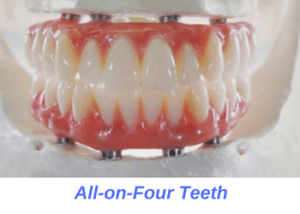
All-on-four teeth are supported by as few as four dental implants
All-on-4 Teeth vs. Full Dentures vs. Full Mouth Dental Implants
There are three methods to replace all of your teeth if you're completely toothless. These are all-on-4 teeth, full dentures, and full mouth dental implants. Sure, dentures are much cheaper, and full mouth dental implants offer you a more thorough solution. However, when it comes to price, functionality, and treatment times, nothing beats all-on-four! The table below explains why more and more patients are choosing all-on-4 teeth to replace all of their missing teeth:
| All-on-4 Teeth | Full Dentures | Full Mouth Dental Implants | |
| Stability | Permanent | Removable | Permanent |
| Chewing Efficiency | Excellent (95%) | Poor-Mediocre (30-50%) | Excellent (100%) |
| Material | Porcelain, Zirconia, Pressed Resin | Pink & White Acrylic | Porcelain or Zirconia |
| Durability | Excellent | Fair | Excellent |
| Average Treatment Times | Same day to 18 months | Same day to 3 months | 1 year to 3+ years |
| Costs | High | Low | Extremely High |
| Jawbone Preservation | Yes (70%) | None | Yes (90%) |
Is all-on-four teeth a good solution for me?
People don't just wake up one day and decide to replace all of their teeth with implants! Most people who choose all-on-four teeth have been suffering from dental problems throughout their entire lives:
- Some have already lost all of their teeth and struggle with full dentures
- Others have spent thousands and thousands of dollars to fix and replace their teeth only to have the restorations break and fail over and over again!
- Some have terminal gum disease and want to replace their teeth with a permanent option
- Some are convinced that their cancer, autoimmune condition, or other medical issues is related to their teeth and would prefer to replace their natural teeth with dental implants
For these people, removing their teeth and replacing them with all-on-four teeth is nothing short of a blessing. With all-on-four dental implants, you no longer have to worry about cavities, infections, or seeing your dentist for deep cleanings! You never need another filling, crown, or root canal. Let's take a look at some of the main benefits of all-on-four treatment for those who need it.
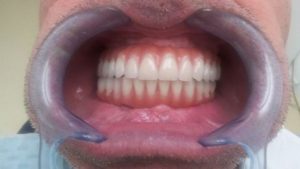
All-on-four teeth feel, look, and function very similarly to natural teeth do
All-on-four replaces all of your missing teeth
With all-on-four dental implants, you replace all of the missing top or bottom teeth. Keep in mind that all of your teeth have to come out before you receive your all-on-four treatment. This means that if you have a few teeth remaining, you would have to have them removed. All-on-four teeth is a great solution if you're unhappy with your dentures. With all-on-four teeth, you can eat, chew, speak, and pretty much function as if you had your original teeth back.
You can receive all-on-four teeth even if you have almost no more jawbone left
Losing your teeth also means that you are losing your precious jawbone. Losing more jawbone makes a big difference in your quality of life. For example, having an insufficient amount of jawbone makes your dentures loose and uncomfortable. At the same time, it becomes difficult to place a whole bunch of dental implants in your mouth if you don't have sufficient jawbone. You will require extensive preparation, including multiple bone grafts and other augmentation surgeries, in order to receive full mouth dental implants.
Most patients automatically assume that they are not a candidate for dental implants. However, this could not be further from the truth. All-on-four solves all these problems by using a clever shortcut to give toothless patients the permanent teeth they have been dreaming about. Here's how: Almost everyone has enough jawbone in the front of their jaws, due to the positioning of the chin and nose. In contrast, most patients with multiple missing teeth have insufficient jawbone in the posterior region due to the positioning of the sinuses and inferior alveolar nerve. All-on-four uses the high-quality jawbone in the anterior region to bypass the need for extensive bone augmentation in the posterior. The implants are placed in the front, where sufficient jawbone always exists. Then, the teeth are extended to cover the posterior region which lacks sufficient jawbone. This means that you can receive a set of stable, permanent teeth without having to undergo multiple surgeries. As a result, the vast majority of patients are good candidates for the all-on-four treatment, regardless of how much atrophy their jaws have gone through.

Almost everyone is a candidate for all-on-four implants, regardless of how much jawbone they have
All-on-four offers the best bang for your buck
Let's be clear here, all-on-four teeth are not cheap by any means. However, they are far less expensive than full mouth dental implants which typically double. Sure, all-on-four teeth cost much more than full dentures. However, all-on-four dental implants offer patients permanent teeth NOT removable ones similar to dentures. There's no price you can put on having permanent teeth back in your mouth. Plus, all-on-4 teeth offer far superior chewing capability, aesthetics, and overall function as compared to full dentures. All-on-four teeth should last a lifetime. Dentures break, become ineffective, and require frequent replacement over the years. When you factor in the lifetime replacement cost of dentures, a lot of times it makes more sense to invest in all-on-four teeth. This is especially true if you're younger and will be enjoying many more years of chewing, smiling, and feeling confident in having your teeth back.
When is all-on-four teeth NOT a good option?
Despite its numerous benefits, all-on-four teeth is not always your best option. Sometimes it's better to invest in crowns and root canals to save your remaining teeth and fill in the gaps with dental implants. Some prefer to save their money and go for dentures. Some patients decide to go for snap-on-dentures or full mouth dental implants instead. Here are a few scenarios where all-on-four treatment may not be the best option for you:
You have plenty of healthy teeth left in your mouth
All-on-four teeth are perfect for patients who want to have a fake, permanent set of teeth and no more natural teeth left in their mouths. All-on-fours are great for toothless individuals. They are also a good option for those who are down to two or three teeth in their mouth and want to receive a fixed set of teeth. However, if you still have 6, 7 or 8 healthy teeth left in each arch, then there might be better options. For example, you may want to consider individual dental implants instead of all-on-4 dental implants. Individual implants cost less and are easier to undergo treatment. Plus, you can keep the remaining teeth that you have. Of course, if your remaining teeth are loose or severely decayed, then the all-on-four treatment is the better way to go. Also, if you have little confidence that your remaining teeth will hold up for another 5 to 10 years, then all-on-four is the better option. Talk to your dentist, do your homework, and decide which route is the best to choose for your mouth.
You want your new teeth to be flawless
When done correctly, all-on-fours offer beautiful, natural-looking, and fabulous teeth. However, if you look closely enough, you may find some minor flaws. For example, all-on-four teeth are connected to one another as a single piece. Additionally, they usually use some pink gum tissue to replace the missing gums. If you are super particular about your looks, you may want to consider full mouth dental implants. With full mouth implants, your teeth will look slightly more realistic. You will also have more implant posts supporting your teeth. Yes, the differences are minute. However, if they are of importance to you, then you should consider full mouth dental implants instead.
You're just as happy wearing your dentures
Not every denture wearer dislikes their dentures. There are some denture wearers who do extremely well with their false teeth. They talk, eat, and function as if they had their own natural teeth. In fact, you wouldn't even know that they're wearing dentures unless they told you so. For these people, investing in all-on-four teeth doesn't make a whole lot of sense. Go purchase a new car instead!
You don't have the finances
Sadly, if you are toothless and penniless, all-on-four teeth are simply out of the question. All-on-four teeth start at somewhere in the low $10,000 range and go up to $40,000. By the way, this is the price per arch which means top or bottom teeth. As you can see, all-on-four teeth are by no means inexpensive. If you can't quite afford all-on-four teeth, but you still want some sort of implant treatment, you might want to consider implant-denture dentures. By placing just a few implant posts, you can stabilize your dentures for a better fit. Implant-supported dentures secure your false teeth without having to spend a fortune.
You can't find the right dentist
If you're in the market for all-on-four teeth, you'll soon realize that only a very small percentage of dentists offer this treatment. Out of the hundreds of dentists near you, probably only 4 or 5 of them are actually proficient at all-on-four treatment. In all likelihood, you will have to switch your dentist. Look for a dentist who is experienced with placing and restoring dental implants. You want a dentist who has been working for at least ten to fifteen years. Look for an experienced implant dentist or a prosthodontist. You may also choose to work with a dental team that involves oral surgeons, periodontists, and general dentists who work closely with one another.
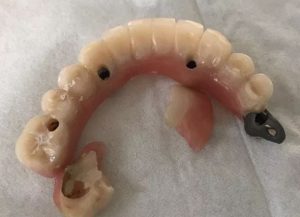
It's very important that you find an experienced dentist for all-on-four treatment
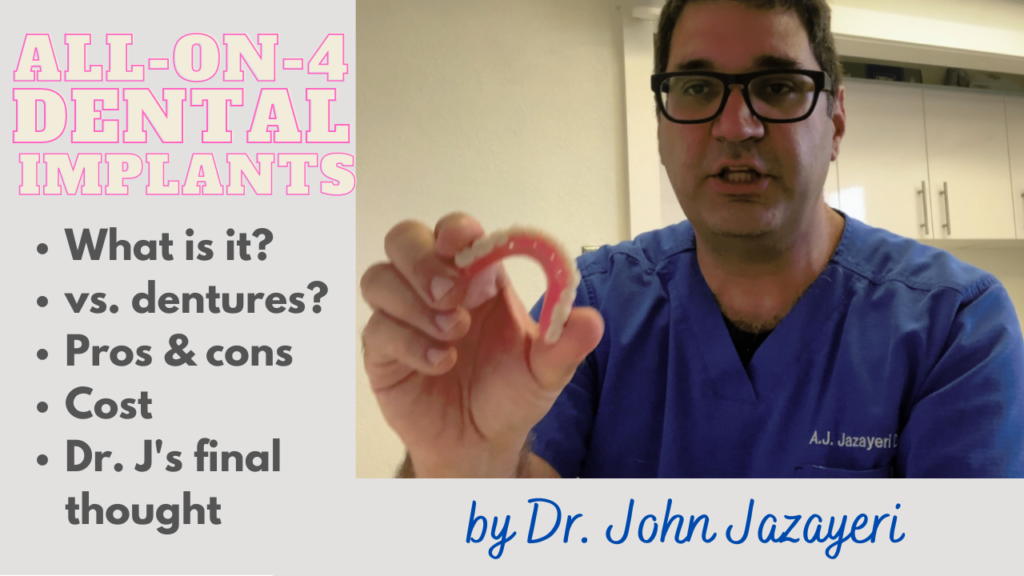
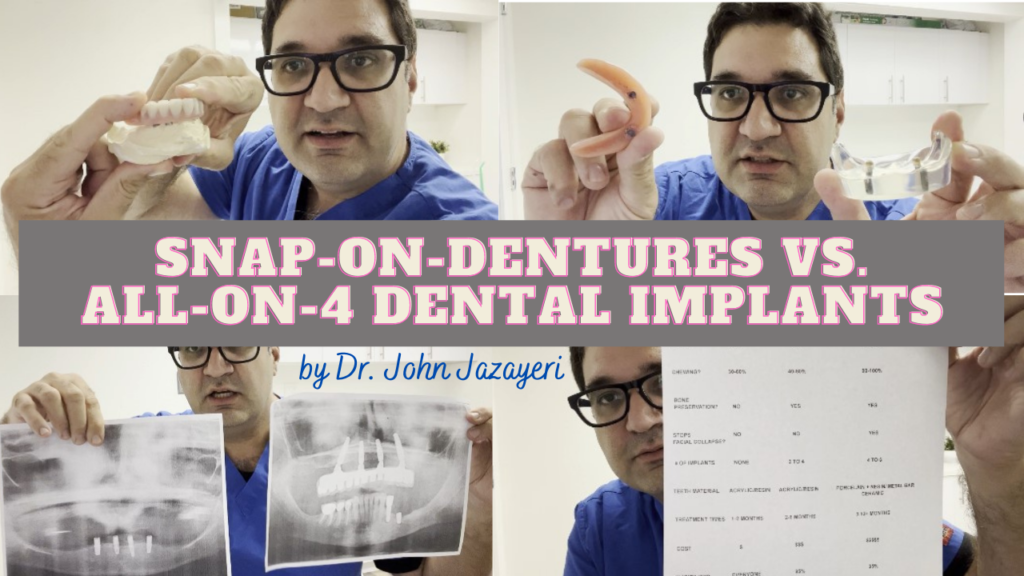
0 Comments